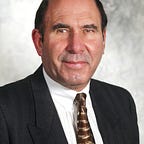The Secret Language of Fathers and Sons
Joel B. Levine MD
The memories of fathers are nestled in quiet moments for every man. Sometimes they come upon us, fresh and vibrant in detail, triggered by an event in which the father’s presence would have been expected. With these thoughts there is an imperceptible pause while you wait for his voice or face to retake its once rightful place.
In each boy’s life, his father is synonymous with something. The memory is different and special for each man. For me it was the walk, from the steak house, where men told sweet lies, to Madison Square Garden for the “big fight”. My father was well known and gregarious with other men. I would walk alongside trying to learn the confidence of his pace and the good fellowship in the pitch of his voice.
With such seeming trivialities, fathers imprint themselves, for good or ill, on their sons. Like most men of his time, my father was a creature of family and work. He lived, in his rough and tumble life, what was the father’s creed: endure all for your son. Violence, denial and dissolution were tastefully hidden behind responsibility, honor, and pride. Pride was all that he wished would flow in his veins.
I have tried to understand what my father did that is still embedded so strongly. It is deceptive in its clarity. Whenever I was uncertain and confronted by the myriad risks to a young man’s ego, he would say: “What are you worried about? I’m in your corner.” It was as simple as that. Not that he would help, not that we would learn “conflict resolution”, or improve my coping skills. Nor, that I would succeed, or even be protected from failure. Just that I would not be alone. He was steadfast.
Knowing that you are important to your father, held dear by him, is all a boy needs. A man who has felt the love of a father is prepared for love in his own life. Too much sophistication and life’s elegant distractions can dull access to that basic feeling. When with his friends, all a bit too deep into the night, he would say to one while looking at me, whether I was 6 or 16: “Pal, do you know who that is?” And someone would reply: “No, Nick, who is it?” The answer heard 1000 times and wishfully just once now, “That’s me.”
Fathers deposit their dreams in their sons but to do so is a gamble. Some accounts pay interest, others do not. Like father, like son, in ways so subtle that only you know how much like you your son really is. Things you conceal from yourself, you can see in him. Every man carries within him the wounds of youth and the failures at 10, humiliations at 12, become impediments at 30. There is little as powerful as the pull of the flesh.
As boys grow to men they seek evidence of their own courage. So common are the rituals of passage, from gangs to Eaton, but they all ask the same question, “Am I yet brave?” A son looks for a father’s courage and seeks to be near it until it can be his own. My father was a wholly admirable man, Not for his success, there was relatively little of that, but for the forbearance of his flaws. Life did, eventually, bring him down but it could not weaken the surety of his love.
A friend recently remarked that the memories of his father’s childhood, as told to him, were as powerful as memories of his own. Men are drawn to the unknown parts of their father’s lives. The clearer that vision, the more comfortable they are within their own skin. The power of a father’s life can, like a ventriloquist’s voice, speak through the actions of the son. Sons do not step as far away as they may think.
It is not surprising that so little of popular culture is dedicated to revealing the true relationship between father and son. Parody is easy and men do not welcome speaking of this secret bond, or the pain of its absence. The absence of this relationship is at the core of the culture of males orphaned, actually or emotionally, from their fathers. Without this, men sense their lives are wanting and become convinced that they can be remade from external things and imported feelings. It makes them fragile and prey to the follies that speak to that empty place.
Father’s Day lingers longer when your father is gone. The loss never really leaves. And when you have a son of your own, you don’t want to tell him what awaits. Father and son almost never talk about their feelings for each other. They may watch the world together and make wry comments as though talking about other men shields you both.
A father keeps his wounds from his son and the son his fears from the father. Love though a kinship of unasked questions. So I wait for another Fathers’ Day when we will feel vulnerable. Father and son, in the open, asked to acknowledge each other, to confirm what each wishes most, that each has done his job well.
\
Top of Form
Bottom of Form
·
